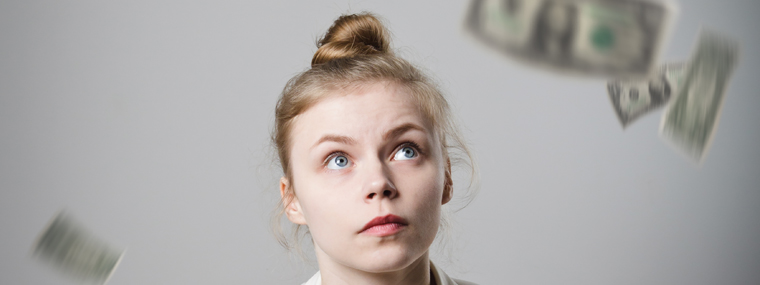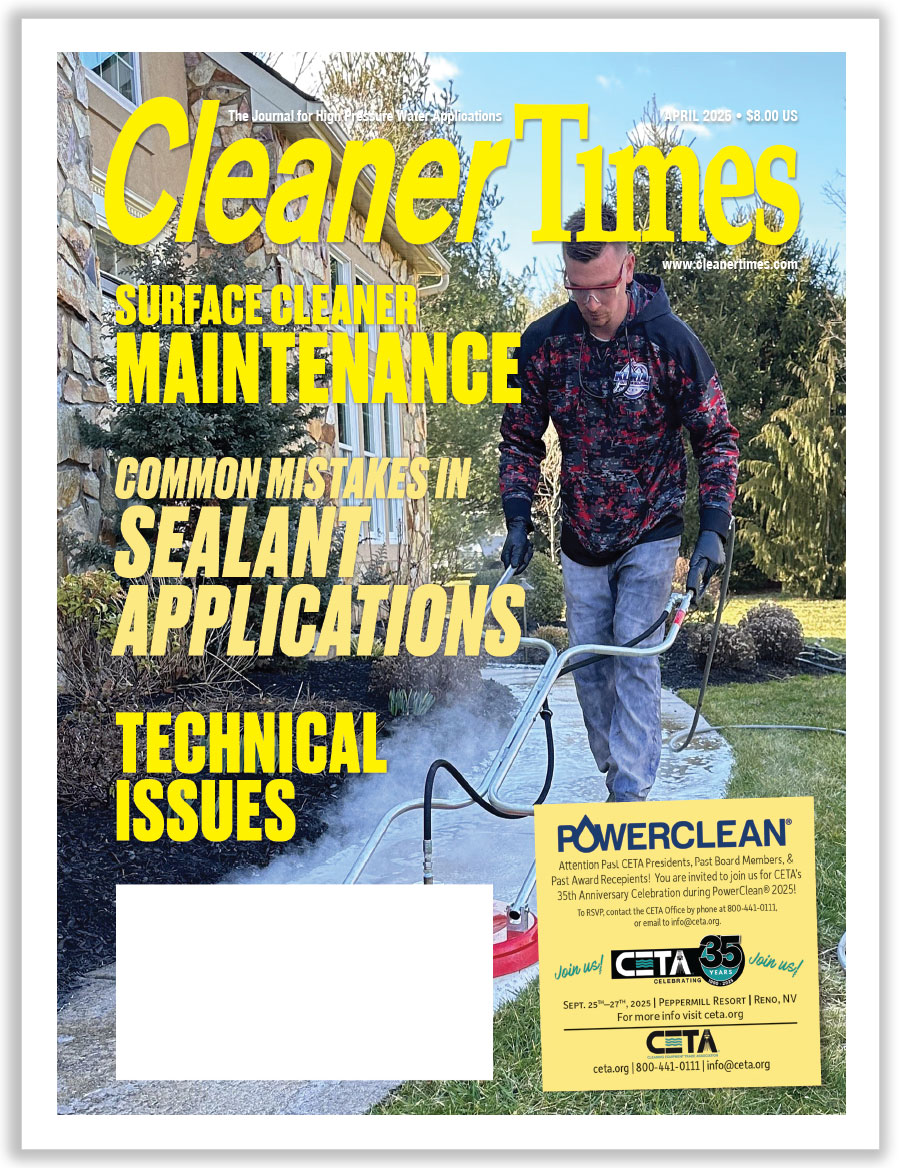
Reasonable Owner Compensation in the Face of Tax Changes
By Mark E. Battersby / Published May 2017

The owners of pressure cleaning businesses operating as S corporations or other pass-through entities must, according to the tax rules and the courts, be “reasonably compensated” for the services they provide. But, how much is reasonable?
Unfortunately, tax law and the IRS have failed to provide shareholders and owners with guidance on how exactly to determine the reasonableness of the compensation paid by their businesses. The bottom line is that the amount of compensation must be reasonable for all services the S corporation owner performs for his or her business and that the reasonable compensation must be triggered by distributions, not profit or loss.
The perennial argument over what is “reasonable” compensation for those operating a pressure washing business as an S corporation or other so-called “pass-through” entities has increased in complexity thanks to the tax rate proposals of our lawmakers. The majority of tax reform proposals put forth by President Trump and our lawmakers would lower the corporate tax rates that are one of the main attractions of pass-through entities—the fact that only one level of tax is imposed, with that on the income passed through to the owner’s tax bill.
What Is A Pass-Through
Pass-through businesses—sole proprietorships (the most common), partnerships, and S corporations—comprise the majority of U.S. businesses, earn more net income than regular “C” corporations, and employ more than half of the private-sector workforce in 49 of the 50 states. Although pass-through entities are not subject to the corporate income tax, many still face a significant tax burden on their investments and profits. They are subject to both the federal individual income tax, with a top rate of 43.4 percent, and state and local income taxes, with rates ranging up to 13.3 percent.
Rather than pay taxes at the business level, these businesses “pass” their income “through” to their owners. The business owners are then required to report the business income on their personal tax returns, so the business income is taxed under the individual income tax.
Reasonably Reasonable
According to the IRS and the courts, to the extent owners of an S corporation perform services for their business, the business is required by law to pay that owner a reasonable salary as compensation for those services. The goal of our lawmakers has always been to prevent the owners of S corporations from exploiting a payroll tax loophole [since social security tax is due on wages but not dividends] by requiring them to pay themselves reasonable compensation for their services before taking distributions.
Generally, the owner/employee of a profitable pressure cleaning business should receive both wages and dividends. The business can reward owner/employees with both bonuses and fringe benefits, although favoring the owner/employee at the expense of others within the business is a definite “no-no” in the eyes of the IRS.
Owner/employees must, of course, include some but not all of the amounts received from their business in their taxable income, although the tax rate usually varies depending on the type of payment. The pressure cleaning business can generally claim a tax deduction for some but, again, not all of those amounts distributed and/or paid to owner/employees as wages or salaries.
Despite the IRS’s rapidly falling audit rates attributed to budget cuts, small business owners have seen a significant uptick in reasonable compensation challenges as the IRS has increasingly trained its tax examiners to examine payroll tax issues. Not too surprisingly, small business owners almost never have good documentation to mount an effective defense of their numbers.
The IRS will typically set a high number, usually near the Social Security maximum, if it determines the reported salary is not defensible. Naturally, if guessing, there’s not only the danger that an owner may be underpaying, and thereby providing grounds for an IRS challenge, but there’s also the danger that the pressure cleaning business may be overpaying when it comes to payroll tax.
Determining Reasonable
Researching and documenting now, versus guesstimating, will make it much harder for the IRS to challenge the numbers of any S corporation owner. Naturally, any disparities with regional or industry averages stick out like a sore thumb to the IRS.
As recently as 2009, a U.S. Government Accountability Office report revealed that in just two previous years, S corporations had underreported their shareholder compensation by nearly $25 billion, with those reporting fewer than three shareholders accounting for the lion’s share of the underreporting.
Although shareholders of a so-called “S” corporation are treated much in the same manner as partners, they are not subject to the self-employment tax on their share of the S corporation’s ordinary income attributable to the operation of the pressure washing business. After all, a corporation is a separate entity for tax purposes.
Reforming Redux
Income earned by a pressure cleaning business operating as a regular “C” corporation is taxed under the corporate income tax in the year it is earned. In addition, when a “C” corporation distributes its income to shareholders in the form of dividends, or when the shareholders sell their stock and realize a capital gain, the income can be taxed a second time under the individual income tax.
Income earned by pass-through businesses is generally subject to only one layer of tax, on the owners’ personal tax return, without a second layer of tax on the business level. Lawmakers will soon explore whether to increase or decrease the seven individual tax rates on ordinary income. These rates are the biggest issue in determining how much pass-throughs pay in federal income taxes.
Proposals to create a new lower tax rate of pass-through business entities raises the question of why pass-through income should be taxed at a lower rate than income from wages and salaries. That could make the tax code “less neutral,” potentially leading individuals to invest in pass-through businesses based on tax considerations rather than the economic merits. Furthermore, a lower rate would benefit owners in the highest tax brackets. A lower tax rate might also be an incentive to label as much income as possible as pass-through income, spurring tax avoidance.
One of the major sticking points in tax reform is how to handle pass-through entities. Most small to mid-sized businesses are organized as S corporations, LLCs, or partnerships. A drop in the corporate rate to 20 percent and a cut in the top individual rate to 33 percent would make it more attractive to do business as a regular corporation, except that dividends would be double-taxed.
One approach is to limit the rate on the “active business income” of pass-through entities to 25 percent. In addition, pass-throughs would have to pay a reasonable compensation to employee/owners. Congress may come up with a viable solution given that they’re aware of the problem. And if the earlier 1986 law change is any indication, provision should be included to allow adversely affected pressure washing contractors, distributors, and manufacturers to switch entities without a penalty.
A Reasonable, Reasonable Compensation
The tax treatment of fringe benefits paid to employees of an S corporation is different from owner-employees who are not shareholders, or who own two percent or less of the outstanding S corporation stock. The fringe benefits paid non-shareholder employees are tax-free. They are excluded from the employee’s taxable wages. Those non-shareholder fringe benefits are deductible by the corporation.
Employee/owners owning more than two-percent of the S corporation stock on the other hand, are not considered employees for fringe benefit purposes, and their fringe benefits
may not be tax-free. Owners of more than two percent of the business are treated in the same manner as partners in a partnership.
Questions Equal More Questions
So-called “reasonable compensation” is not the only issue for incorporated businesses. As mentioned, the profits of a closely-held pressure washing business can be distributed as either wages or as dividends. Typically, a closely-held, incorporated pressure cleaning business avoids double-taxation by paying most of its profits in the form of a bonus or by leaving profits in the business as accumulated earnings.
While the IRS obviously has a field day re-characterizing bonuses paid by an incorporated business as non-deductible dividends, the non-payment of sufficient dividends relative to profits can subject them to the accumulated earnings tax—a penalty for retaining already-taxed profits in the business rather than distributing them as dividends.
With the accumulated earnings tax raised from 15 percent to 20 percent of a pressure washing operation’s accumulated earnings and the IRS including S corporations in the accumulated earnings equation, reasonable compensation that is too high for regular “C” corporations, but too low for S corporations, is rapidly becoming an even bigger issue.
In order to both profit from and avoid the potential pitfalls of reasonable compensation in the face of accumulated earnings, early planning is essential before an audit results in headaches and expensive penalties. With the IRS specifically tackling issues such as reasonable compensation in this era of dwindling audit numbers, seeking professional guidance for reaping those tax breaks can ensure that you, the owner/employee of a pressure cleaning business, have the proper substantiation and don’t run afoul of the tax laws in this area.





